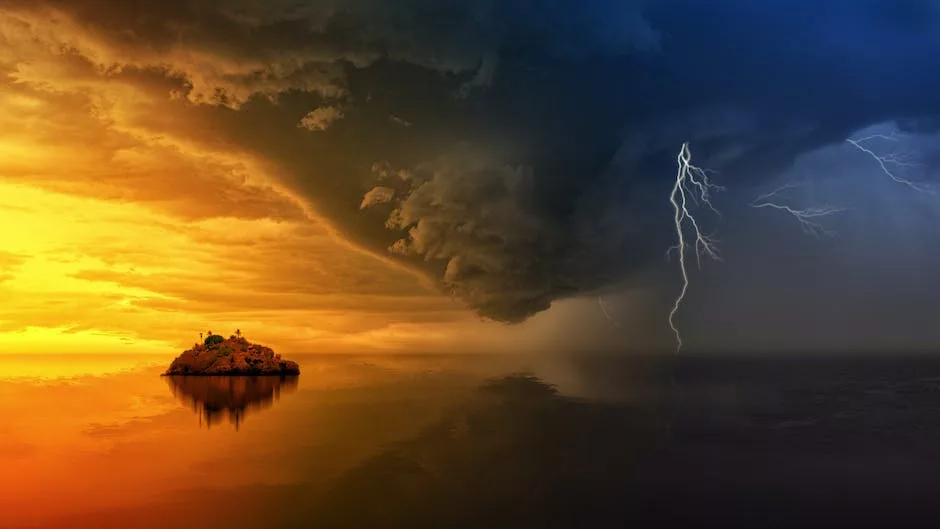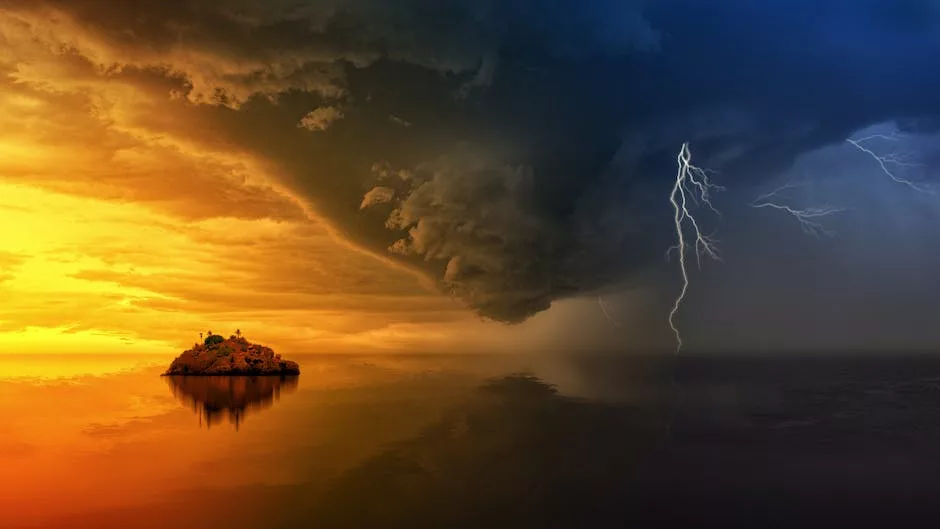Introduction
“Weather or Not: Insights from the Editor” is a publication that provides valuable insights and information about various weather phenomena. From extreme weather events to climate change, this publication aims to keep readers informed and educated about the ever-changing world of weather. With expert analysis and engaging content, Weather or Not offers a comprehensive understanding of the impact and significance of weather in our daily lives.
The Impact of Climate Change on Extreme Weather Events

Weather or Not: Insights from the Editor
Climate change is a hot topic these days, and for good reason. It’s not just about melting ice caps and rising sea levels; it’s also about the impact it has on our everyday weather. As the editor of a weather magazine, I’ve seen it all – from scorching heatwaves to bone-chilling cold snaps. And let me tell you, climate change is no laughing matter. Well, maybe it is a little bit.
Extreme weather events have become more frequent and intense in recent years, and scientists agree that climate change is to blame. But what does that mean for us? Are we doomed to a future of never-ending hurricanes and blistering heat? Well, not exactly. While climate change does play a role in these extreme events, it’s not the only factor at play. So, let’s dive into the impact of climate change on extreme weather events and separate fact from fiction.
First things first, let’s talk about hurricanes. These powerful storms have been making headlines for years, and it seems like they’re only getting stronger. But is climate change really to blame? The answer is a resounding yes. Warmer ocean temperatures provide the fuel that hurricanes need to form and strengthen. So, thanks to climate change, we can expect more intense hurricanes in the future. But don’t worry, I’m sure your beach vacation will be just fine.
Next up, let’s talk about heatwaves. We’ve all experienced those days when stepping outside feels like walking into an oven. And guess what? Climate change is making those days even hotter. Rising temperatures and prolonged heatwaves are becoming the new normal, and it’s all thanks to our good old friend, greenhouse gases. So, if you’re planning a summer picnic, you might want to invest in a good sunscreen and a portable air conditioner. Trust me, you’ll thank me later.
Now, let’s move on to something a little cooler – winter storms. You know, those days when you wake up to find your car buried under a mountain of snow. Well, climate change has a hand in those too. Warmer temperatures can lead to more moisture in the air, which means more snowfall. So, while you’re out there shoveling your driveway, just remember that climate change is giving you an extra workout. Who needs a gym membership when you have Mother Nature?
Last but not least, let’s talk about droughts. These dry spells can wreak havoc on agriculture, water supplies, and our overall well-being. And you guessed it, climate change is making them worse. Rising temperatures and changing precipitation patterns are causing more frequent and severe droughts around the world. So, if you’re thinking about starting a garden, you might want to invest in some drought-resistant plants. Or better yet, just buy a cactus and call it a day.
In conclusion, climate change is having a profound impact on extreme weather events. From hurricanes to heatwaves, winter storms to droughts, we’re seeing the effects of a changing climate all around us. But it’s not all doom and gloom. By understanding the role that climate change plays in these events, we can better prepare and adapt to the changing world around us. So, the next time you’re caught in a rainstorm or sweating through a heatwave, just remember – it’s all part of the weather or not game. Stay informed, stay prepared, and don’t forget your umbrella.
Understanding the Role of Weather Forecasting in Disaster Preparedness
Weather or Not: Insights from the Editor
Understanding the Role of Weather Forecasting in Disaster Preparedness
When it comes to disaster preparedness, there’s one thing that often gets overlooked – the weather. Yes, that’s right, the weather! You might be thinking, “What does the weather have to do with disaster preparedness?” Well, my friend, let me tell you – it has everything to do with it!
Picture this: you’re sitting at home, enjoying a nice cup of tea, when suddenly the sky turns dark and ominous. The wind starts howling, and rain starts pouring down like there’s no tomorrow. You panic, not knowing what to do. Should you stay inside? Should you run for cover? Should you start building an ark? Well, if you had paid attention to the weather forecast, you would have known what to expect and how to prepare.
Weather forecasting plays a crucial role in disaster preparedness. It helps us anticipate and plan for extreme weather events such as hurricanes, tornadoes, and blizzards. By knowing what’s coming our way, we can take the necessary precautions to keep ourselves and our loved ones safe.
But let’s be honest, weather forecasting isn’t always accurate. We’ve all experienced those moments when the forecast predicted sunshine, but we ended up getting drenched in a downpour. It’s like the weather has a mind of its own, playing tricks on us just for fun. So, how can we trust something as unpredictable as the weather?
Well, my friend, that’s where the meteorologists come in. These brave souls dedicate their lives to studying the atmosphere and predicting what it has in store for us. They analyze data from satellites, weather stations, and even their trusty crystal balls (just kidding, they don’t actually use crystal balls, but it would be cool if they did). They use sophisticated computer models to simulate the behavior of the atmosphere and make educated guesses about what the weather will be like in the future.
Now, I know what you’re thinking – “But if the weather forecast isn’t always accurate, why should I bother paying attention to it?” Ah, my skeptical friend, let me enlighten you. While weather forecasting may not be 100% accurate, it’s still pretty darn good. In fact, studies have shown that modern weather forecasts are about 85% accurate for the next day and 80% accurate for the next three days. That’s not too shabby, if you ask me.
So, how can we use weather forecasts to prepare for disasters? Well, for starters, we can stay informed. By regularly checking the weather forecast, we can stay up to date on any potential weather hazards in our area. We can also take proactive measures to protect ourselves and our property. If a hurricane is on the horizon, we can stock up on supplies, secure our homes, and even evacuate if necessary. If a blizzard is coming our way, we can make sure we have enough food, water, and warm clothing to last us through the storm.
In conclusion, weather forecasting is a vital tool in disaster preparedness. It helps us anticipate and plan for extreme weather events, giving us the knowledge and time to take the necessary precautions. While it may not always be 100% accurate, it’s still pretty darn good. So, my friend, the next time you see a weather forecast, don’t just brush it off. Take a moment to pay attention, because whether you like it or not, the weather plays a big role in our lives.
Exploring the Connection Between Weather and Human Health
Weather or Not: Insights from the Editor
Ah, the weather. It’s a topic that never fails to spark conversation, whether you’re waiting in line at the grocery store or sitting in a crowded elevator. We humans are obsessed with the weather, and for good reason. It affects our daily lives in more ways than we realize, including our health. Yes, you heard that right. The weather and our well-being are more connected than we might think.
Let’s start with the obvious. We all know that a sunny day can lift our spirits and put a spring in our step. It’s like nature’s way of saying, “Hey, go out and enjoy life!” On the other hand, a gloomy, rainy day can make us feel like we’re living in a never-ending episode of a sad soap opera. But did you know that these weather-induced mood swings can actually have an impact on our mental health? It’s true!
Studies have shown that prolonged exposure to gloomy weather can increase the risk of depression and seasonal affective disorder (SAD). So, the next time you find yourself feeling down on a rainy day, don’t blame it on your favorite TV show ending. Blame it on the weather gods!
But it’s not just our mental health that is affected by the weather. Our physical health is also at the mercy of Mother Nature. Take allergies, for example. If you’re one of the unlucky souls who suffer from seasonal allergies, you know that the weather can be your best friend or your worst enemy. A dry, windy day can send pollen flying through the air, triggering sneezing fits and itchy eyes. On the other hand, a rainy day can provide some much-needed relief by washing away the allergens. It’s like nature’s own allergy medication, minus the side effects.
And let’s not forget about the impact of extreme weather events on our health. Hurricanes, heatwaves, and blizzards can wreak havoc on our bodies, leaving us vulnerable to a whole host of health issues. From heatstroke to frostbite, these extreme weather conditions can be downright dangerous. So, the next time you find yourself complaining about a little rain or snow, remember that it could be a lot worse. Count your blessings and grab an umbrella or a shovel, depending on the forecast.
Now, I know what you’re thinking. “But Mr. Editor, what can we do about all this? Are we at the mercy of the weather gods forever?” Fear not, my friends, for there are things we can do to protect ourselves from the whims of the weather. For starters, we can dress appropriately for the conditions. I know it’s tempting to wear flip-flops and shorts on a sunny day, but trust me, your body will thank you if you layer up when it’s cold or wear sunscreen when it’s hot.
We can also take steps to improve our mental health, regardless of the weather. Engaging in activities that bring us joy, like exercising, spending time with loved ones, or indulging in a guilty pleasure (hello, Netflix binge), can help boost our mood and keep those rainy day blues at bay.
So, the next time you find yourself cursing the weather, take a moment to appreciate the connection between weather and human health. It’s a fascinating and sometimes humorous relationship that reminds us that we are not separate from nature, but rather a part of it. And who knows, maybe the next time you’re stuck in an elevator with a stranger, you can strike up a conversation about the weather and impress them with your newfound knowledge. You’re welcome.
Conclusion
In conclusion, “Weather or Not: Insights from the Editor” provides valuable insights into the field of weather forecasting and its impact on various industries. The editor’s expertise and experience shed light on the challenges faced by meteorologists and the importance of accurate weather predictions. The article emphasizes the need for continuous improvement in weather forecasting models and technologies to enhance accuracy and reliability. Overall, this piece offers valuable information for both professionals in the field and individuals interested in understanding the intricacies of weather forecasting.



